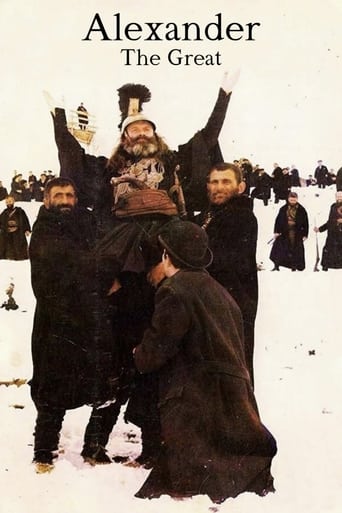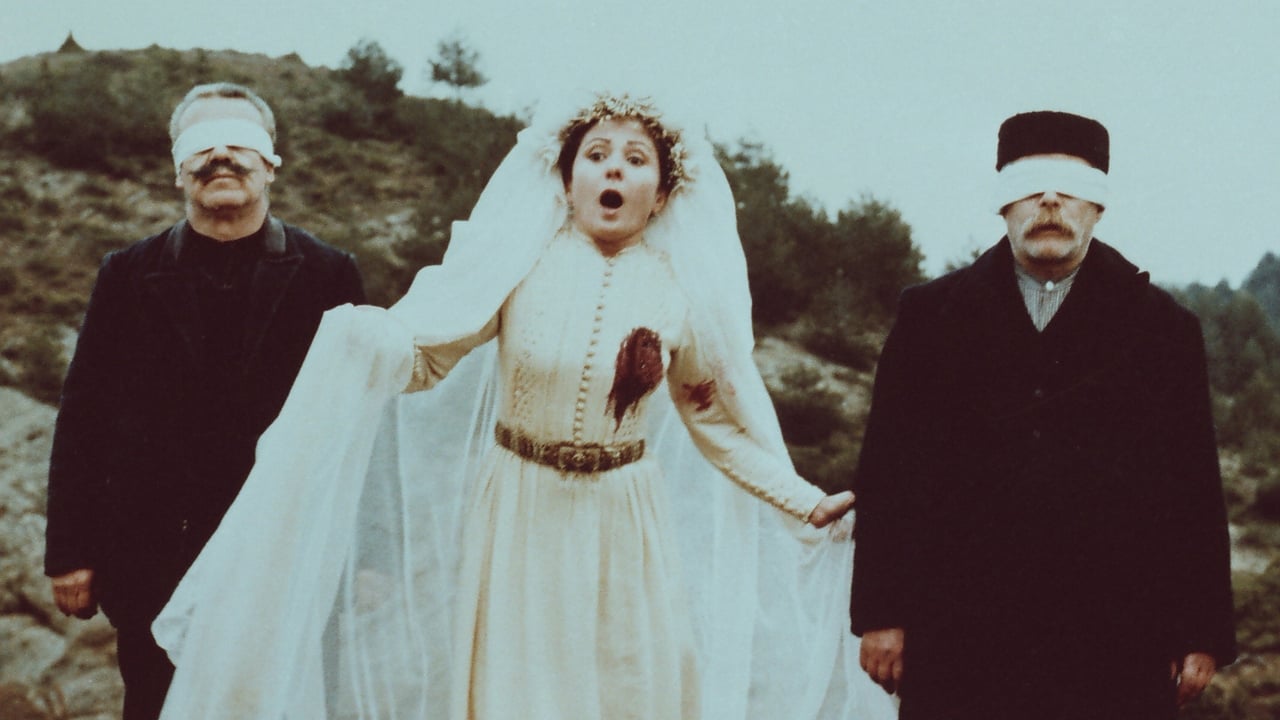Martin Bradley
The more I see of Theo Angelopolous' work the more convinced I am that he was possibly the greatest director in the history of the movies and yet at almost 3 1/2 hours long "Alexander the Great" is not an easy film to sit through. You know while watching it that he could have made a much shorter film if he had wanted to without sacrificing any of the plot but Angelopolous is a man who likes to hold shots even when nothing much is happening in them; in other words he gives you time, (and lots of it), to take in the action or lack of it. This, like so much of his work, is a film told almost entirely in images rather than words and every shot is composed for the maximum dramatic effect. Working again with cinematographer Ghiorgos Arvanitis there are images here as fine as any in cinema. Even if the film does seem overlong it is always visually stunning. The Alexander of this film isn't the great Greek warrior but a bandit who has kidnapped a party of English aristocrats and holds them to ransom while at the same time taking over the village commune in the mountains where his presence is virtually that of a warlord. As with other Angelopolous political films this, perhaps unfortunately, tends towards the polemical rather than the dramatic. The aristocrats, for example, are used purely as props and even Alexander himself is more of a figurehead rather than a character in his own right. Angelopolous' habit of shooting mostly in long-shot means we never get close enough to any of the characters to really get to know them. Here we have a film in which there are only groups rather than individuals and narratively this is a difficult film to follow. Time and again I lost track of who was doing what to whom. Perhaps this is why, however great the film looks, it is never the historical epic that say, Visconti's "The Leopard" was. Yet this remains a considerable achievement. Films, particularly epics, this rigorous don't come along very often. This is a film that demands a great deal from its audience but stick with it and you will be amply rewarded. Like all of this great director's work it is a film you will take with you and brood over for a very long time. It may not be his greatest film but even Angelopolous working just below his best is still stands head and shoulders above his contemporaries.
jrd_73
Theo Angelopoulos is a controversial filmmaker. His films are hailed by many as grand and poetic and by many others (Roger Ebert for one) as trying and pretentious. The films of Angelopoulos have played a part in my own life. In 1999, as a young man with a minor in film studies, I took a chance, despite the mixed reviews, and rented Ulysses' Gaze. At the time, I was living with a friend who had a earned master's degree in ancient Macedonian history. He fell asleep about an hour into the film, but I stuck it out, hypnotized by the film's visual style and Harvey Keitel's performance. Ulysses' Gaze was unlike anything I had ever seen before. A few months later, I was fortunate enough to road-trip 250 miles to catch Eternity and a Day in a movie theater. I declared that film another masterpiece and well worth the travel expenses. I hungered to see more Angelopoulos films, but living in the rural Midwest my options were limited. I remember renting by mail VHS tapes of The Travelling Players and Landscape in the Mist from Video Library out of Pennsylvania. I liked both films, but did not connect to them as emotionally as I had Ulysses' Gaze or Eternity and a Day. Some time later, I bought an import DVD of Trilogy: The Weeping Meadow from Great Britain. It was another good, if not great, film from Angelopoulos. Then came a long, dry spell. A decade passed. My love for art movies did not exactly expire but did wane somewhat due to being away from film classes and not keeping up with what was being released. Finally, a British company released all of Angelopoulos' films in DVD box sets. At the end of last year, I bought all three sets. Alexander the Great is the second film I have watched from the sets. Neither grabbed me. I dismissed my reaction to Reconstruction as being the result of the film being a debut work, a filmmaker struggling to find his way in cinema. I approached Alexander the Great with high hopes. The story sounded intriguing and the film had won awards. Unfortunately, I found it to be a total bore. The narrative concern Alexander, a peasant leader, who leads a kidnapping of British dignitaries. Alexander takes the hostages to a mountain village that is being ran as a commune. Italian anarchists hear about Alexander and the commune and join. Meanwhile, the Greek government is nervous, being pressured by the British government to return the hostages safe and sound. Alexander demands that all the peasants' fields be returned to them and that complete amnesty be granted to himself, his men, and the community. These demands, particularly the amnesty condition, upset the government. As the situation stalls, a rift begins to develop in the village. Alexander is a great leader but his power begins to run counter to the communal nature of the village. Another reviewer compared Alexander the Great to 1900. Both films begin on January 1, 1900 and the theme of communal living runs through both. However, 1900 covers decades and is a more satisfying film. The main problem with Alexander the Great is length. There just is not enough here, in either scope or story, to justify the extended running time. After an hour, I gave up and began hitting the fast forward button. I doubt I could have gotten through the film any other way. Questions arise now that I have watched and been disappointed by both Reconstruction and Alexander the Great. If I re-watched Ulysses' Gaze or Eternity and a Day would they still strike me as masterpieces? Have my film tastes changed significantly in the decade since I last watched an Angelopoulos' film or are Reconstruction and Alexander the Great just dull movies, missteps by a usually good director? I can't answer these. What I can say is that a viewer needs to approach Alexander the Great with a great deal of fortitude. It cannot be watched casually.
runamokprods
Continuing his epic explorations of Greek history in the 20th century, Angelopoulos goes back to the turn of the century, where a charismatic rebel leader calling himself "Alexander the Great" takes a handful of visiting English upper class young lords and ladies hostage, in an effort to win back the land that was taken from the farmers by and bankers. But, of course, in an Angelopoulos film things are always more complex than they first seem, and Alexander, while charismatic, is also madly ego driven, and encourages a cult of personality around himself. Returning to his home village, which is experimenting with Utopian Communism and shared wealth, Alexander is seen first as a hero, fighting to help the people achieve their dream society, but eventually he becomes a tyrant as cruel and arbitrary as any master. This is a central theme Angelopoulos is exploring. Creating Utopian socialist societies almost always demands people of power and military action, but those same people (almost always male) almost inevitably corrupt the experiment because of the nature of who they are. The very thing that makes them enablers of a new order also dooms them to destroy it. This film has a much more straightforward narrative than Angelopoulos' 2 preceding 'history' masterpieces; "The Traveling Players" and "The Hunters". Unlike those films, It doesn't jump around in time, and we stay pretty focused on this one specific incident, in this one specific village. And there is a downside to that. At 3 hours and 19 minutes, the film isn't complex enough to stay as fascinating as its progenitors. It's full of great images and wonderful, often painfully tense scenes. But on a meta level it's pretty easy to guess where it's all going, and it can get frustrating waiting for it to get there. Still an excellent film, partly based in truth (although the incidents actually happened in the 1870s), but it lacks the multi-layered magic of the two films that proceeded it. It also is generally far more naturalistic, so that when the magic and surreal suddenly come up, they can feels out of place and un-integrated. One thought. It's very interesting to compare this and Bertolucci's "1900", which I just re- watched recently. They are both long, epic films by European masters set at the turn of the century, and exploring the class struggle, and the domination of the farmers and workers by bigger more powerful forces. Both are very strong films. "Alexander" is the more subtle, complex, intellectual, and thought provoking, "1900" the more entertaining and emotional. Both are flawed,but well worth your time.
ulyssestone
Oh man! I hope I am NOT the 41st person in IMDb who get to this film. This was the Winner of Golden Lion and FIPRESCI Prize in Venice! This film is not about Alexander the Great(356-323 BC), but a mysterious rebellion in the beginning of the 20th century in Greek. It is full of extremely graphic beauty, wonderful scene attempting, imaginative symbols, and, of course, convincing long takes. Even better than the heavenly Ulysses's Gaze. It is said to be the successor of the trilogy Days of 36, The Travelling Players and The Hunters, but to enjoy this film one does not have to take a Greek History lesson first, seeing this film would at least be one of your most unforgettable visual experience, and its metaphysical power would stick inside your mind for a long long time. Highly recommended. Get hold of this when you could find it,open your DVD-Rom and your mind, and that would be a revealing journey.


 AD
AD


